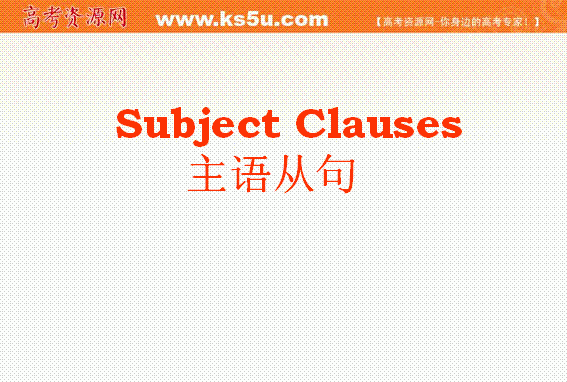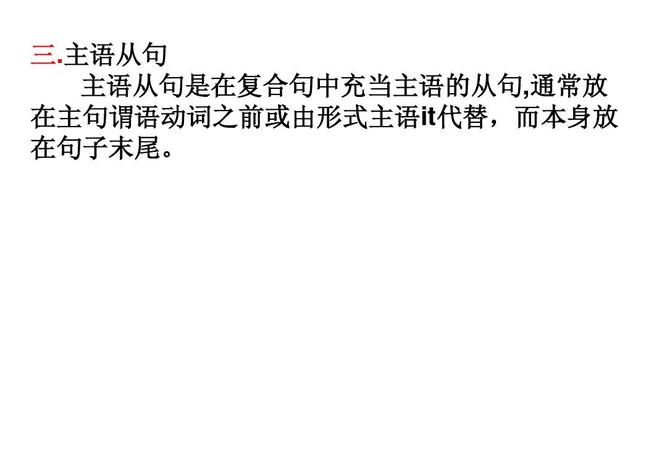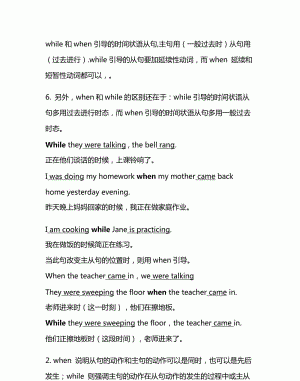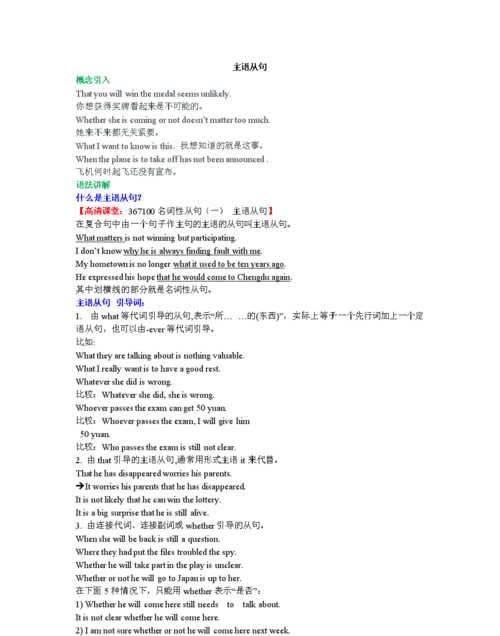本文目录
主语从句的从句部分
主语从句
主语从句(Subject Clause)
定义:如果一个句子在复合句中充当一个主语,那么这个句子就是主语从句.
第一部分:常规主语从句,即句子在复合句中充当一个主语
(1)That he finished writing the composition in such a short time surprised us all.
(2)Whether we will go for an outing tomorrow remains unknown.
(3)Who will be our monitor hasn't been decided yet.
(4) Whom we must study for is a question of great importance.
(5)What caused the accident remains unknown.
(6)Whatever you did is right.
(7)Whose watch was lost is unknown.
(8)What we need is time.
(9)What we need are good doctors.
小结:
(1)引导主语从句连词有that,whether,who,what,whatever等
(2)连词位于句首不能省略
(3)主语从句大多数情况下视为单三,但也有例外,如例9
第二部分:为了防止句子头重脚轻,通常把形式主语it放在主语位置,真正主语搁置于句末
(1)It is certain that he will win the match.
(2)It is true that he has made a very important discovery in chemistry.
(3)It is very likely that they will hold a meeting.
(4)It is strange that he should do that.
(5)It is important that we all should attend the meeting.
(6)It is strange that the man should have stuck to his silly ideas.
(7)It is a pity that we won't be able to go to the south to spend our summer vacation.
(8)It is still a mystery what caused the accident.
(9)It is said that he has gone to shanghai.(=He is said to have gone to shanghai)
(10)It is known to all that the gun powder was first invented by the Chinese.
(11)It is suggested that the work should be done with great care.
(12)It seems that he has seen the film.(=He seems to have seen the film)
(13)It happened that the two cheats were there. (=The two cheats happened to be there)
小结:
(1)以that 引出的主语从句,常以形式主语it引导. It is +形容词/名词/某些动词ed + that 从句.
(2) 在有些that从句中要用虚拟语气 (should+do/should+have done)例句4,5,6,11.
主语从句与宾语从句两者的用法和在句中的作用是不同的,下面从它们的各自用法,介绍:)
一.主语从句
主语从句 定义:在句子中担当主语的是一个从句,这个从句就叫做主语从句。
主语从句是在复合句中充当主语的从句,通常放在主句谓语动词之前或由形式主语it代替,而本身放在句子末尾。
1. It 作形式主语和it引导强调句的比较
It 作形式主语代替主语从句,主要是为了平衡句子结构,主语从句的连接词没有变化。而it引导的强调句则是对句子某一部分进行强调,无论强调的是什么成分,都可用连词that。被强调部分指人是也可用who/whom。例如:
It is a pity that you didn’t go to see the film.
2. 用it 作形式主语的结构
(1) It is +名词+从句
It is a fact that … 事实是…
It is an honor that …非常荣幸
It is common knowledge that …是常识
(2) it is +形容词+从句
It is natural that… 很自然…
It is strange that… 奇怪的是…
(3) it is +不及物动词+从句
It seems that… 似乎…
It happened that… 碰巧…
(4) it +过去分词+从句
It is reported that… 据报道…
It has been proved that… 已证实…
3. 主语从句不可位于句首的五种情况
(1) if 引导的主语从句不可居于复合句句首。
(2) It is said , (reported) …结构中的主语从句不可提前。例如:
It is said that President Jingo will visit our school next week.
(3) It happens…, It occurs… 结构中的主语从句不可提前。例如:
It occurred to him that he failed in the examination.
(4) It doesn’t matter how/whether …结构中的主语从句不可提前。例如:
It doesn’t matter whether he is wrong or not.
(5) 含主语从句的复合句是疑问句时,主语从句不可提前。例如:
Is it likely that it will rain in the evening?
4. What 与that 在引导主语从句时的区别
What 引导主语从句时在句时在从句中充当句子成分,如主语.宾语.表语,而that 则不然。例如:
What you said yesterday is right.
二:宾语从句的几个特征:1、引导词:what\which\whose\when\whether\if\where
2语序:宾语从句必须是用陈述语句。
如:I think that you must work harder.
宾语从句的引导词、连接词的区别、否定转移等现象。
(1)表达时间的几个句型:一般用when或者是what time:
What time will the train leave?
由于时刻都是固定的,也可以用一般现在时代替一般将来时:
What time does the train leave?
(2)时间的表达方式:8:19(nineteen past eight),7:57(three to eight),在时间的中间也可以加上分的单词(minutes)
(3)had better +动词原型。意思是提要求,建议。但是上下级不能用这种方式,因为语气太重:
You had better give up smoking .
(4)sb leave sth +地点
I left my book in my classroom yesterday.
(5)may I have your name(address\age)?一般询问对方的年龄、名字等,不要习惯以前的问法,这样很不礼貌,而是要采访上面的问法。以前的习惯是:how old are you? \what's your name?
(6)修饰名词的代词次序:限-描-大-形-年-颜-籍-物-类+名词:
this is a bridge.
This is a beautiful bridge
补充:从句的语序永远是陈述句。

关于主语从句的ppt
It is the season when the place is full of flowers. 这是一个鲜花盛开的季节。
主语:it
谓语:is
宾语:the season
定语从句(修饰season):when the place is full of flowers
It is...引导词...
1、作强调句时:把It is...that/who去掉,句意不影响,成分不残缺。
例如:It is the children who broke the window. 是孩子们打破窗户的。
这个句子把It is...that/who去掉,变成the children broke the window. 句意不受影响,成分不残缺,所以可以判断这个句子是强调句。
2、作主语从句时:It是形式主语,that从句的真正主语(即主语从句)。如果把It is...that去掉,句意会受影响,成分排列乱七八糟且残缺。判断是否是主语从句时,可以把that从句一整个代入"it"的地方,如果句意完整,成分齐全,那八九不离十就是主语从句了。)
例如:It is a pity that you know nothing about. 很遗憾,你对这件事一无所知。
这个句子把It is...that去掉,变成a pity you know nothing about . 句意受影响,成分也是乱七八糟且残缺,所以可以判断这个句子不是强调句。
调换语序变为That you know nothing about is a pity. 很明显是一个主语从句。
3、作定语从句时:it是真正主语,引导词前面一般有先行词。
(例句如本题。when从句很明显是修饰season,所以season也就是先行词。)
小建议:强调句就是一个大坑,很多人看见it is就马上判断是强调句,立马选that或者who,但是要判断清楚,出现it is也有可能是主语从句,或者其他从句噢。

英语六大从句句式及例句
1.主语从句 1)主语从句可直接位于主语的位置,如果从句较长,谓语又较短,可用it作形式主语,而将从句放在句末。常见的句型有: *It is a fact\a pity\a question\good news that... 2)what引导的主语从句表示“...的东西时”,一般不用it作形式主语。 What we lack is experience. 3)what,who,when,why,whether等词含有各自的疑问意义,但它们引导的主语从句,都用陈述语序。 How the plan is to be carried out should be discussed again. 2.宾语从句 1)宾语从句可位于及物动词、介词和某些形容词后。连词that常可省略。介词后一般接疑问词引导的宾语从句。in that(因为),except that(除了),but that(只是)已构成固定搭配,其他介词后一般不接that引导的宾语从句。 *I promised that I would change the situation. 2.宾语从句 1)宾语从句可位于及物动词、介词和某些形容词后。连词that常可省略。介词后一般接疑问词引导的宾语从句。in that(因为),except that(除了),but that(只是)已构成固定搭配,其他介词后一般不接that引导的宾语从句。 *I promised that I would change the situation. 3.表语从句 表语从句出现在结构为“主语+系动词+表语从句”的句子中。表语从句除可用that,what,when,why,whether,how等引导外,还可由because,as if(though)等引导。that常可省略。如主句主语为reason,只能用that引导表语从句,不可用because. Perhaps the most important thing to remember is that there is no one common type of life in America. 2)宾语从句后如有宾补,要用形式宾语it来代替,而把宾语从句移至宾补之后。 He has made it clear that he would not change his mind. 4.同位语从句 同位语从句用于对前面出现的名词作进一步说明,一般用连词that引导,由于先行名词的意义不同,也可用whether,who,when,where,what,why,how等引导。常见的先行名词有fact,idea,belief,news,hope,conclusion,evidence,suggestion,order,problem,report,decision.有时由于谓语较短,将同位语从句位于谓语之后。 She finally made the decision that she would join the fashion show. 5.定语从句 定语从句所修饰的先行词可以是名词或代词,也可以是一个句子。定语从句通常位于先行词之后,由关系代词或关系副词引导。 *限制性定语从句 限制性定语从句修饰先行词,对先行词起修饰作用,紧接先行词之后,无逗号,若省去,原句意思不完整。引导定语从句的关系代词有who,whom,whose,which,that等。who,whom,whose用于指人,whose有时也可指物,相当于of which;which用于指物;that既可指人也可指物,但只用于限制性定语从句中。关系代词除了引导定语从句,替代先行词外,还在从句中担任主语、宾语、定语等。 The computers and cables which make up the Internet are owned by people and organizations. Those who live alone or who are sick may have trouble in getting close to other people. The girl whose parents died in an accident is living with her grandmother. 1)当先行词是all,anything,everything,something,nothing等不定代词或先行词前有first,last,any,few,much,some,no,only以及形容词最高级修饰时,只能用关系代词that引导从句。 That is all that I've heard from him. He's the first person that I'm going to interview this afternoon. 2)关系代词的省略 在从句中作宾语的关系代词常可省略。关系代词紧跟介词,作介词宾语时不可用that,只可用which或whom引导从句,并且不可省略,但当介词位于宾语从句句末时,作为介词宾语的关系代词仍可用that,也可省略。 This is one of those things with which we have to put up. This is one of those things (which\that) we have to put up with. 3)引导定语从句的关系副词有when,where,why等。关系副词在从句中作状语,意义上相当于一个“介词+which”的结构。 Even in comic books where(=in which) there are no words,the stories are fully expressed through the drawings. No one knows the reason why(=for which) he was so angry that day. 6.状语从句 *时间状语从句 引导时间状语从句的从属连词和词组有: 1)when,whenever,while,as,after,before,since,till,until,once等。 We have learnt quite a lot about it since we came here. 2)as soon as,hardly(scarcely)...when,no sooner...than,each(every) time,the moment,immediately(that)等。 As soon as I sent an e-mail message,I received positive responses. The moment he heard the good news,he jumped with joy. *地点状语从句 引导地点状语从句的连词是where,wherever. Wherever she went,she took her little daughter with her. *原因、结果和目的状语从句 1)引导原因状语从句的从属连词有:because,as,since,now(that),seeing that,considering that,in that等。 Considering that he is a freshman,we must say he is doing well. 2)引导结果状语从句的连词有:so...that,such...that,so that,that,so等。 Mickey Mouse is so attractive that the children are reluctant to leave. 3)引导目的状语从句的连词有:so that,in order that,for fear that,lest等,从句常使用may,might,can,could,would等情态动词。 We got up early this morning so that we could catch the first bus to the railway station. *条件和让步状语从句 1)引导条件状语从句的连词和词组有if,unless,as(so) long as,on condition that,in case,provided(providing) that,supposing等。 As long as you have the right equipment,you can use a telephone line to transmit computer data. 2)引导让步状语从句的连词和词组有though,although,whether,even though,even if,no matter what(when,how...),whatever(whenever,wherever,however....)等。though,even if等引导状语从句可转换成含有as的部分倒装结构,具有强调意义。其结构为“形容词(副词、动词、名词)+as+主语+谓语”。 No matter what you may say,I would not change my mind. Young as he is,he is quite experienced in this work.(=though he is young) Child as he is,he can speak English fluently.(=though he is a child) *方式状语从句 引导方式状语从句的连词有as,just as,as if,as though等。as if,as though引导的状语从句中,谓语动词常用虚拟语气,表示与事实相反。 The young man made the experiment just as the teacher had taught him. Everything went on as usual as if nothing had happened.

主语从句例句
主语从句在复合句中做句子的主语。引导主语从句的词有连词that, whether; 连接代词 who, what, which; 连接副词 when, where, how, why等。接下来给大家罗列几个经典的主语从句例句
What is needed for the space trip is careful preparation.
Whether wild life can be well protected is of great importance.
Who will go makes no differences.
Why dinosaurs died out remains a puzzle.
Which kind of food is the best is still not certain.
为了避免主语显得过长,可以用it 作为句子的主语,把主语从句移到句子的末尾。如:
It hasn't been decided yet when the new restaurant will open.
It is not clear how gold was found there.
It is hard to understand why there is gravity.
It is a shame that you have to leave so soon.

以上就是关于主语从句实话的高级例句 ,主语从句的从句部分的全部内容,以及主语从句实话的高级例句 的相关内容,希望能够帮到您。
